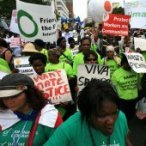
5 December 2011 | Videos | Resisting neoliberalism | Gender | Climate Justice and Energy | Food Sovereignty | COP 17
Gender Equality to Achieve Climate Justice
Fighting climate change as part of the fight against capitalism: the women’s perspective
Download: MP3 (1.8 Mb)
Several women organizations arrived in Durban to express their point of views at the side events held in parallel to the United Nations COP 17 on Climate Change, which will last until December 9.
Some of the organizations are very critical towards the capitalist system, which they claim is the main cause of inequalities, including gender inequality. The women claim that they are the most affected by climate change and that climate justice cannot be achieved without gender justice.
Real World Radio interviewed Tica Moreno from the World March of Women at the Global Day of Action for Climate Justice held on Saturday in Durban.
Moreno explain that the World March of Women is in Durban as part of a “global process of resistance to capitalism, which is a patriarchal system that is expanding more and more for the commodification of nature”. “This is the time to put feminism back in the fight against global patriarchal capitalism”.
The activist also criticized market mechanisms that have helped the developed nations “buy their way out” of greenhouse gas emissions reductions. An example of this are Clean Development Mechanisms (CDM) under the Kyoto Protocol, through which developed countries fund so called “clean” projects in the global south to offset their polluting emissions. In this way there are no actual emissions cuts in the developed counties, which are the main responsible for the climate crisis.
These mechanisms are “appropriating women’s work, women’s time, as if it were an inexhaustible resource, in the same way they do with nature”, said Moreno. “Our aim is to show the feminist perspective of how the commodification of life is related with nature, work, male chauvinism”.
She explained why women and peasant organizations claim women are the worst affected by climate change: “Women around the world are the main responsible for the sustainability of human life”, she said. Heavy rains, floods, drought and other climate events make it hard or prevent certain work from being done to ensure the community’s subsistence.
Moreno also referred to the alternatives proposed by women to fight climate change. “Women around the world are building agroecology in the struggle for food sovereignty”.
Agroecology and sustainable peasant agriculture without big machinery or agrotoxics help “cool down” the Earth, says La Via Campesina. The very concept of food sovereignty implies a system change, with special emphasis on food supply to communities and local populations avoiding traveling big distances. The agriculture and transport sectors are two of the biggest polluters worldwide. “Women are experiencing the real solutions against market mechanisms”.
Emily Tjale of the South African Movement for Land Access, told Real World Radio a few days ago that “there cannot be climate justice without gender justice”. We asked Moreno what, according to the World March of Women, was necessary to achieve climate justice.
She said: “First of all there needs to be equality. Climate justice to us has a very strong equality dimension. It means that women have to have autonomy over their bodies, their lives, their jobs, that women have to live free of violence, to sum up that egalitarian relations between men and women should exist in all walks of life”.
She concluded that in order to achieve climate justice “we also need to have an influence on the sexual division of labour that supports the ruling capitalist system”. “Climate justice to us is the dimension of an alternative system, of a new paradigm of sustainability of human life that builds equality between men and women”.







